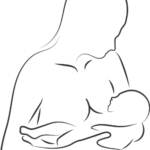Image credit to India Times
Baby Getting Enough Breast Milk? Of the most common concerns of many breastfeeding parents is not having enough breast milk. When you bottle-feed, you can measure how much formula or breast milk your baby is getting. But when you’re nursing straight from the breast, you might wonder how much milk your baby is actually getting at each feeding.
So how do you know if you’re making enough breast milk and your baby is getting enough to eat? While you can’t see and directly measure the amount of breast milk in your breasts or in your baby’s tummy when you’re nursing, there are other ways to tell if your baby is getting the nutrition they need. Here are the best signs that your baby is getting enough breast milk.
Signs Your Baby Is Getting Enough Breast Milk
Baby Getting Enough Breast Milk?
During the first few days of life, it is normal for a breastfed baby to lose up to 10% of their birth weight. However, after the first few days, consistent weight gain is the best way to confirm that your baby is getting enough breast milk. Other signs that indicate that a newborn is getting enough breast milk include
Your baby is latching on and breastfeeding at least every two to three hours around the clock, or eight to 12 times each day.
You’re changing wet diapers. After the first four or five days after birth, your baby should have at least six wet diapers per day.
You can hear your baby swallowing while they are nursing.
Your breasts feel softer after breastfeeding and not as full as they did before the feeding.
Your baby appears satisfied and full after feeding and sleeps between feedings.
Bow Movements: A Trusty Sign?
While the frequency of wet diapers is a good indication that a newborn is getting enough breast milk, bowel movements are a less clear-cut sign. Within a couple of days of birth, an exclusively breastfed baby’s stool will turn greenish-yellow before it becomes a looser, mustard-yellow stool that may or may not have milk curds called “seeds” in it. But when it comes to the number of dirty diapers, every baby is different. It’s normal for a baby to have a poopy diaper with every diaper change. This is normal because breast milk is so easily digested. It is also normal for a breastfed baby to have a bowel movement just once every few days or even once a week.
Signs Your Baby Isn’t Getting Enough Breast Milk
While a steadily gaining baby is likely getting adequate breast milk, here are some signs that your newborn may not be getting enough:
1. Your baby isn’t gaining weight as expected or has fallen off their growth curve.
2. Your baby is crying, sucking, and showing signs of hunger even with frequent breastfeeding.
Tip
Keep all routine well-baby doctor visits. During these visits, the health care provider will examine your baby and measure their growth to track that they are growing as expected.
Less Reliable Indicators of a Baby’s Breast Milk Intake
There are a great deal of misconceptions surrounding breast milk supply and how one can know if a nursing baby is getting enough breast milk. Some of the less reliable indicators of breast supply and a baby’s breast milk intake are discussed below.
Breast fullness
It’s normal if the breasts of lactating parents do not feel “full” in the first days following birth. The first milk that your body produces is called colostrum, and your body makes relatively little since your newborn’s stomach is still so small.
As you continue nursing, your body will regulate itself to produce the quantity of milk your baby needs when colostrum changes over to mature breast milk. This increase in volume can be rapid and is what brings on breast engorgement, though some nursing parents go through engorgement without feeling full and breastfeed along just fine.
Also Read : Best Water To Use for Baby Formula
Sleeping through the night
In the first two months, your baby should nurse every two to three hours, even throughout the night. After two months, many babies start to have longer stretches between feedings during the night.
While some babies will sleep through the night by 3 months of age, most won’t for many more months. If this is also true of formula-fed infants, then whether a baby sleeps through the night or not isn’t an indicator of whether a baby is getting enough breast milk or not.
Crying after feedings
While a baby can cry after feeding due to hunger, there is also a myriad of other reasons a baby cries, from gas to tiredness. If your baby consistently cries after feedings, however, consult a healthcare professional.
Frequent feedings
If your baby has been doing pretty well on the breast, yet all of a sudden seems to want to nurse constantly—what is sometimes called cluster feeding—it’s not necessarily a problem with your milk supply; rather, it’s probably a growth spurt.
Growth spurts in babies will occur at different times, but some of the common times for newborn and infant growth spurts are approximately 10 days, 3 weeks, 6 weeks, 3 months, and 6 months old.
While a baby is having a growth spurt, she will want to nurse more often. This increase in breastfeeding normally only lasts a few days. This increased frequency is necessary to stimulate your body to produce more breast milk to keep up with your baby’s growing nutritional needs.
Long feedings
There are no rules for how long a baby should nurse at each feeding. Let your baby determine the schedule and how long she wants to nurse.
A baby may be on the breast for a long period of time, but if they are actively sucking only for a couple of minutes in an open-pause-close type sucking pattern, they likely still are coming off the breast hungry. Rather than tracking how long feedings are, watch for other signs of fullness such as a relaxed body and hands and turning away from the breast.
Expressing small amounts of milk
The amount of breast milk you express with a breast pump is not the most accurate indication of how much milk your baby gets from nursing. It is normal for a nursing baby to be more effective and efficient than a breast pump. If you appear to express only a small amount of milk when pumping, but your baby is otherwise showing all indications that he or she is getting enough breast milk, there is no reason to be concerned.
Coming off the breast but showing signs of hunger
A baby who comes off the breast mid-feed, yet still looks hungry, doesn’t mean your milk has “dried up” or that your baby isn’t getting enough milk. They just aren’t finished feeding most of the time. Babies often fall asleep at the breast during the first couple weeks of life when the flow of milk slows down, even if they have not had their fill. Gently wake your baby to encourage them to continue nursing until satisfied.










